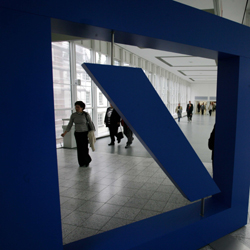Capital News
 The Deutsche Bank announced a billion-dollar capital increase following the close of trading on 29 April. Overall, the Institute placed 90 million new shares at a price of €32.90 apiece by an accelerated procedure. The bank collected a total of €2.96 billion, it announced on 30 April. 2.8 billion euros had previously been targeted. Since the Deutsche Bank managed the capital increase itself, it has no great cost. Compared to other globally active investment banks the largest German bank still lags in capital construction because of the Basel III capital rules. To date, management had precalculated how the bank would comply with the stricter capital requirements of the Basel Committee without a capital increase, which is usually bad for the share price. Now the bank says it has finally got rid of its biggest problem. The share issue is reported likely to lift the core capital ratio to around 9.5 per cent.
The Deutsche Bank announced a billion-dollar capital increase following the close of trading on 29 April. Overall, the Institute placed 90 million new shares at a price of €32.90 apiece by an accelerated procedure. The bank collected a total of €2.96 billion, it announced on 30 April. 2.8 billion euros had previously been targeted. Since the Deutsche Bank managed the capital increase itself, it has no great cost. Compared to other globally active investment banks the largest German bank still lags in capital construction because of the Basel III capital rules. To date, management had precalculated how the bank would comply with the stricter capital requirements of the Basel Committee without a capital increase, which is usually bad for the share price. Now the bank says it has finally got rid of its biggest problem. The share issue is reported likely to lift the core capital ratio to around 9.5 per cent.
On their own: equity in German SMEs increases
The equity position of many medium-sized companies has become more tear-resistant, according to a recent survey by business information supplier Creditreform: nearly one third of SMEs have an equity ratio of more than 30 percent of total assets; in the previous year, only 28 percent were able to show such a quota. Only about 28 percent of the companies showed a weak ratio of up to 10 percent, fewer than last year.
The manufacturing sector cuts the best figure: here almost 41 percent of the companies have a rate of more than 30 percent. The construction industry and the service sector have also increased.
Capital adequacy is an important factor for the credit rating of companies. Although mainly large companies still come with a lot of equity, small businesses are now also increasingly actively pursuing a higher equity ratio.
Concern about loans: not scarce, but expensive
Although interest rates are historically low, many SMEs fear they cannot get fresh money. The SME Mann + Hummel sees the stricter rules for banks under Basel III as a challenge for many small and medium enterprises. Simply put: under the new rules, loans would need to be refinanced in the banks with the same ongoing financial instruments. Although the new rules will come into force only in 2014, the banks were already gearing up to it.
Experts from the Commerzbank's SME Bank warned especially that the loans would become more expensive. Already, according to the German Chamber of Industry and Commerce, machine builders, say, who need very large sums, or strong research companies have struggled to get new capital. Usually the bank gives a loan only if the applicant is supported by a bank guarantee. The demand for guarantees rose according to Bürgschaftsbank Baden-Wuerttemberg especially in the financial crisis, because it could reduce the risk and lower the cost of credit.















